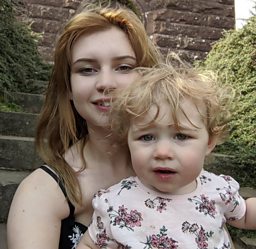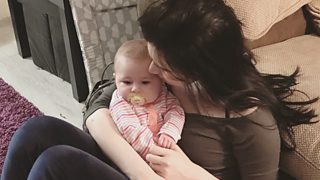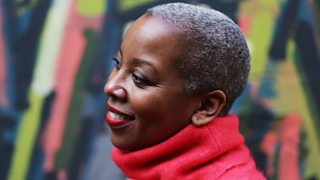Sensory overload: My life as an autistic mother
In Radio 4's podcast The Flipside with Paris Lees, we hear from women learning to connect as they struggle with human contact or the lack of it. How important is physical affection and is it something we take for granted? This is a question of crucial importance to 23-year-old mother Sarah Keiller, who is autistic.
The impact of pregnancy and motherhood in a person who is extraordinarily sensitive to certain kinds of touch can be overwhelming if not devastating. This is Sarah's story.
Pregnancy is a complicated time for most who go through it, but few people have the intense sensory experience that 23-year-old Sarah Keiller did. This is due to her autism; she’s very sensitive to certain kinds of touch, and they can trigger anxiety, rather than comfort her. She admits: “I hated being pregnant, I’m sorry… just wanted her to be here. Didn’t want to have to go through the pregnant part.”
Dacher Keltner, Professor of Psychology at UC Berkeley, says that different kinds of touch can have a variety of meanings, and can both signify and lead to complex emotional responses. He explains: “When you think about the very simple language of touch, we use it to soothe people and to calm their stress response down, to convey that the world is safe; and we use touch to express affection.”
Knowing that even a simple touch has the potential to overwhelm her senses, Sarah was very concerned when she became pregnant two years ago. “The birth was very, very overwhelming,” she says. “The contractions weren’t just in my tummy, they were everywhere. I felt like my whole body was being squeezed – full-body hot pokers.”

Sarah explains her difficulties with pregnancy describing how sound can affect her: “If someone has a certain way of talking – using a lot of articulation, and speaking at a higher volume – I find it physically distressing. I can feel my arms tingling and my back tingling… [when there is] someone speaking, I physically feel it.”
If someone hugs me, and they squeeze me, that's nice.
According to , “Many autistic people haveβ€―sensory differences. They may be over-sensitive to some senses, under-sensitive to others and often a combination of both. For example, for someone who is over-sensitive to touch and sound, people brushing past them and a loud announcement at a train station could cause pain and sensory overload, that may trigger a meltdown.” A meltdown can result in screaming, kicking or even biting.
For Sarah, touch can also cause sensory overload, but not in quite the same way as sound. She explains: “Light touching gives me a shiver right up my arms and my back. If I'm in a really distressing situation, it's like I can feel it over my body… but I like deep pressure. So if someone hugs me, and they squeeze me, that's nice.”

Sarah found that, once in labour, the strategies she usually used to soothe herself in scenarios that threatened to trigger her anxiety were no longer working for her, and she had a meltdown. “I couldn’t ground myself with anything that I’d normally try to ground myself with,” she explains. “I remember just repeating the words, 'Shutdown. Shutdown. Shutdown'. That’s the aftermath of the meltdown, so you just completely [zone out].”

I’ve got to hold her in a certain way that's making me not feel physically distressed.
Dacher Keltner says that Sarah’s description of the sensations she experienced through labour and birth can help us discover more about the complex relationship between touch and emotion that’s instilled in us from birth. He says: “Touch is the most sophisticated communication system that is online when infants enter into the world, and it is the platform in which they connect to caregivers, for the first several years of life. It is, in many ways, the fundamental language of social connection.”
Maternal instincts
Just like any other person giving birth, though, when the baby arrived, Sarah was flooded with feelings of love and relief. She recalls: “I was like, 'oh, thank goodness, she's alive. I just want to hug her all the time and keep her safe.' My maternal instincts kind of really took over there, and I'm very glad about that.”
Dacher Keltner adds: “The little things we enjoy from our parents from a really young age, whether that's having your tummy tickled or a big strong hug, don't just feel good - they're really important for our emotional wellbeing. And Sarah knew this, even as she struggled with it.”
Sarah found caring for a newborn tested her sensory responses: the overstimulation that she has always known, versus her need to show her baby daughter, Lila, physical affection. She says: “I’ve got to hold her in a certain way that's making me not feel physically distressed, because it's fine when she's not moving, just cuddling. When she starts moving around, doing a lot of things that are very unpredictable, it's like I’m really trying to battle against it. I’m trying to battle against two ideas, and two feelings.”
Barriers
There is an invisible battle that Sarah faces as a parent and a person with autism that the outside world rarely sees or hears about. “There are barriers that I wish obviously weren't there” she explains. “But I need to be there, that's my job as a mother. The physical feelings are very intense but they are very temporary, whereas [the] guilt [of not being able to do something Lila needs] is something that will stay around for a very long time.”
Lila is now two years old – and Sarah is besotted with her lively toddler: “She’s just the best. She’s so funny! Anyone who meets her just falls in love with her because she’s just such a delight.” Lila likes hugging, too; “a good strong cuddle,” says her mother. “So I'm very happy about that.”
You can find out more about Sarah's experiences in The Flipside with Paris Lees.

More absorbing listening for the Seriously minded
-
![]()
Battle for the Capitol
With Trump out of office, Leah Sottile on what’s next for America’s far-right.
-
![]()
Will live music ever be the same again?
Arlo Parks speaks to musicians about how the pandemic is affecting them.
-
![]()
39 Ways to Save the Planet: Wood for Good
Tom Heap and Dr Tamsin Edwards uncover fresh ways to save the planet from climate change.
-
![]()
Transcendence: How Can I Feel Art Again?
Gaylene Gould has become immune to art. Can she reawaken her sensitivity?




